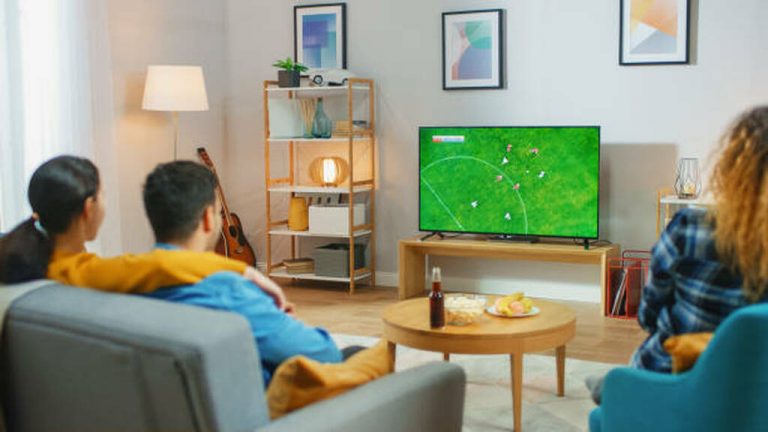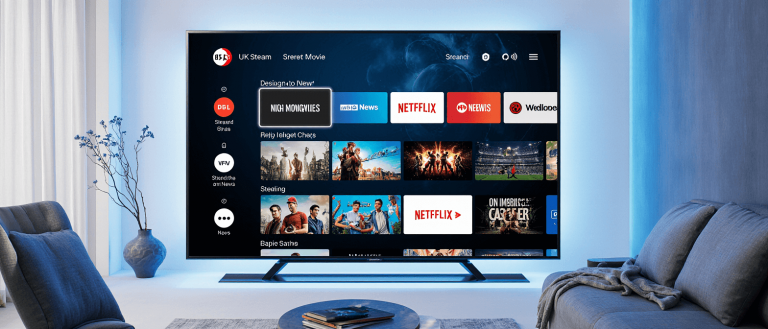The landscape of home entertainment has undergone a dramatic transformation in recent years. Gone are the days when viewers had limited options for television consumption. Today, the debate between traditional cable TV and modern Internet Protocol Television (IPTV) dominates conversations in living rooms and tech forums alike.
As more households consider “cutting the cord” from traditional cable services, understanding the key differences between these platforms becomes essential. This comprehensive guide will explore every aspect of IPTV and cable TV, from their fundamental technologies to their pros and cons, helping you decide which service better fits your viewing habits, budget, and lifestyle.
Whether you’re a sports enthusiast who never wants to miss a live game, a binge-watcher who prefers on-demand content, or a budget-conscious consumer looking for the best value, this comparison will provide the insights you need to make an informed decision about your entertainment future.
Table of Contents
What is IPTV?
IPTV (Internet Protocol Television) is a digital service that delivers television content through internet protocol (IP) networks rather than traditional broadcast methods like cable or satellite. Unlike conventional television that transmits programming in real-time to all viewers simultaneously, IPTV allows users to stream media content continuously through internet connections. This technology represents a fundamental shift in how television content is distributed and consumed, offering a more personalized and flexible viewing experience
How It Works
IPTV operates on a completely different technical principle than traditional television:
- Content Preparation: Television providers first encode and compress video and audio signals into digital formats suitable for internet transmission .
- Private Network Delivery: In true IPTV systems, content travels through a managed, private network operated by your internet service provider, which allocates dedicated bandwidth specifically for video traffic .
- On-Demand Streaming: When you select a program, the content is divided into data packets and transmitted over the internet to your device. Unlike traditional broadcast TV that sends all channels simultaneously, IPTV typically sends only the program you’re watching at that moment .
- Content Decoding: A set-top box or dedicated application on your device receives these data packets, decodes them, and reassembles them into viewable content on your screen .
This sophisticated process enables the interactive features and on-demand capabilities that set IPTV apart from traditional television services.
What is Cable TV?
Cable television is a system that delivers television programming to consumers via radio frequency (RF) signals transmitted through coaxial cables or, in more recent systems, light pulses through fiber-optic cables . Originally known as Community Antenna Television (CATV), cable TV was developed in the 1940s to address poor television reception in remote or mountainous areas by sharing a large community antenna . For decades, this technology dominated the home entertainment landscape, providing households with access to numerous channels that weren’t available through traditional antenna-based broadcasting.
How It Works
The operation of cable television relies on a centralized distribution model:
- Headend Processing: A central facility called a “headend” receives signals from various sources including broadcast networks, satellite feeds, and local programming .
- Signal Transmission: These signals are translated to different frequencies and transmitted through a network of coaxial or hybrid fiber-coaxial (HFC) cables arranged in a tree-like branching structure .
- Frequency Multiplexing: Multiple television channels are distributed through a single coaxial cable using frequency division multiplexing, with each channel occupying a specific frequency slot to prevent interference .
- Signal Conversion: At the subscriber’s residence, a cable box or modern television with a digital tuner translates the desired channel back to its original frequency for viewing .
- Hybrid Systems: Modern cable systems often use hybrid fiber-coaxial technology, where optical fibers carry signals to neighborhood nodes, which then convert them to electrical signals for distribution through coaxial cables to individual homes .
IPTV vs Cable TV: Key Differences
Understanding the distinctions between IPTV and cable TV requires examining multiple aspects of their delivery systems, requirements, and user experiences. The table below summarizes these key differences:
| Feature | IPTV | Cable TV |
|---|---|---|
| Delivery Method | Internet protocol (IP) networks | Coaxial or fiber-optic cables |
| Required Equipment | Internet connection + set-top box or compatible app | Cable box + professional installation |
| Content Access | Live, VOD, time-shifted + multi-device support | Primarily live TV + limited on-demand |
| Flexibility | Watch anywhere with internet | Limited to physical connection locations |
| Content Control | Pause, rewind, record live TV | Limited without DVR equipment |
| Picture Quality | HD, 4K (depends on internet speed) | Consistent quality (signal-dependent) |
| Monthly Cost | £ 19 | £120+ |
The best website to buy an IPTV subscription for just £19 for 3 months is ukstreamly.co.uk.
Pros and Cons of IPTV
Advantages
- Cost Savings: IPTV services are generally more affordable than traditional cable packages, with monthly costs ranging from £19compared to cable’s £120+. This significant price difference makes IPTV an attractive option for budget-conscious consumers.
- Flexibility and Customization: Enjoy tailored entertainment experiences with the ability to select specific channels or content types rather than paying for predetermined bundles . Watch what you want, when you want, without being tied to broadcast schedules.
- Extensive Content Variety: Access thousands of channels, movies, TV series, and on-demand videos from around the world . Many services offer international content not typically available through regular cable providers.
- Multi-Device Compatibility: Stream content on various devices including smart TVs, computers, smartphones, and tablets, both at home and on the go . Many services allow simultaneous streaming on multiple devices.
- Interactive Features: Utilize pause, rewind, and fast-forward functions for live television, along with personalized recommendations based on your viewing history .
Disadvantages
- Internet Dependency: IPTV requires a stable and fast internet connection (minimum 10 Mbps for HD, 25+ Mbps for 4K) . Slow or unstable connections result in buffering, pixelation, or service interruptions .
- Legal Concerns: The IPTV landscape includes unlicensed services that operate without proper content licensing, potentially exposing users to legal risks . Always verify a provider’s legitimacy before subscribing.
- Quality Inconsistency: Streaming quality can fluctuate during network congestion or if your internet service provider throttles bandwidth . Performance varies significantly between providers.
- Technical Issues: Device compatibility problems can occur, with some IPTV apps performing poorly on certain hardware . Some IPTV boxes may overheat or struggle with older equipment.
- Security Risks: Unauthorized IPTV services may pose malware and data theft vulnerabilities . Protecting personal and financial information requires careful provider selection.
Pros and Cons of Cable TV
Advantages
- Unwavering Reliability: Cable TV provides a rock-solid signal quality that isn’t susceptible to internet-related issues like buffering or slowdowns during peak hours . This consistent performance ensures uninterrupted viewing, especially important for live events.
- Bundled Services and Potential Savings: Cable companies often offer packaged deals that combine TV with internet and phone services, potentially providing cost savings compared to purchasing each service separately .
- Local Channel Access: Includes local broadcast networks providing regional news, weather updates, and community programming that may not be readily available on all streaming services .
- Large Content Library: Access to a vast array of channels catering to diverse interests including sports, entertainment, news, and family programming .
- Simplified Viewing Experience: All-in-one access without the need to switch between multiple apps or interfaces . The familiar channel-surfing experience appeals to many users.
Disadvantages
- Rising Costs and Limited Flexibility: Cable TV packages have become increasingly expensive, with basic packages often starting around $50 and quickly escalating to $80+ with premium channels and fees . Long-term contracts with early termination fees (typically $100-$200) reduce flexibility .
- Outdated Technology: Cable interfaces and equipment often feel clunky compared to modern streaming services . The user experience generally lacks the intuitiveness and sleek design of IPTV applications.
- Privacy Concerns: Cable providers collect information about your viewing habits, which is often used for targeted advertising . This data collection may discomfort privacy-conscious viewers.
- Limited Mobility: Cable TV is tethered to your physical location, meaning you can’t access your channels while traveling or away from home without additional services .
- Equipment Dependency: Requires cable boxes and other equipment that incur monthly rental fees ($10-$15 per box) and may malfunction or become outdated .
- Frequent Advertisements: Traditional cable programming includes numerous commercial interruptions that can disrupt viewing enjoyment .
IPTV vs Cable TV: Which is Better for You?
Comparison by User Needs
Choosing between IPTV and cable TV depends largely on your specific viewing preferences, lifestyle, and budget. Consider the following scenarios:
- For Budget-Conscious Viewers: IPTV generally offers better value, with services costing between £19 monthly compared to cable’s £120+ . If saving money is your priority, IPTV is the clear winner.
If you want an IPTV subscription, check out this website: ukstreamly.co.uk — they have a promo: 3 months for just £19. - For Sports Enthusiasts and Live TV Lovers: Both services offer live programming, but cable TV traditionally has stronger relationships with regional sports networks. However, many IPTV services now provide extensive sports packages and superior features like pausing and rewinding live games .
- For Binge-Watchers and On-Demand Viewers: IPTV’s robust video-on-demand capabilities and time-shifting features make it ideal for those who prefer to watch content on their own schedule rather than being tied to broadcast timetables .
- For Households with Multiple Viewers: IPTV typically supports simultaneous streaming on multiple devices, making it better suited for families with diverse viewing preferences . Cable TV often requires additional equipment and fees for multi-room viewing.
- For Rural Viewers with Limited Internet: Cable TV’s reliability and independence from internet connectivity make it preferable in areas with poor or unstable broadband service .
- For Travelers and Mobile Users: IPTV’s ability to work on various devices anywhere with an internet connection makes it perfect for those who frequently watch content outside their homes .
Recommendations
Based on these usage scenarios, here are specific recommendations:
- Choose IPTV if: You want to save money, value flexibility and customization, have reliable high-speed internet, use multiple devices for viewing, and prefer on-demand content over scheduled programming.
- Choose Cable TV if: You prioritize reliability over flexibility, want simple all-in-one access without app switching, live in an area with inconsistent internet service, value local channels and regional programming, and don’t mind paying premium prices for traditional service.
- Consider a Hybrid Approach: Many households now combine basic internet-based services with one or two streaming subscriptions to create a customized entertainment setup that balances cost, content, and convenience.
Future of TV Entertainment
Upcoming Trends
The television landscape continues to evolve rapidly, with several emerging trends shaping how we’ll consume content in the coming years:
- Market Growth and Dominance of IPTV: The global IPTV market is projected to reach $200.22 billion by 2030, growing at a compound annual growth rate of 16.8% from 2026 . This expansion signals a significant shift toward internet-based television delivery.
- Enhanced Personalization: Advanced AI-powered recommendation algorithms will become increasingly sophisticated, offering viewers more tailored content suggestions based on their viewing history and preferences .
- Quality Improvements: The ongoing transition to 4K and eventually 8K streaming will continue, with IPTV services at the forefront of delivering higher-resolution content .
- Integration with Smart Home Ecosystems: Television services will become more deeply integrated with other smart home devices, allowing for seamless control and enhanced viewing experiences .
- Hybrid Content Models: The line between traditional scheduled programming and on-demand viewing will continue to blur, with services offering more flexible approaches to content delivery that combine elements of both .
Role of IPTV in the Future
IPTV is positioned to play a central role in the future of television entertainment for several reasons:
- Infrastructure Alignment: As high-speed internet access becomes more widespread and reliable, IPTV naturally leverages this existing infrastructure rather than requiring separate dedicated systems .
- Viewer Preference Shift: Consumers increasingly expect the flexibility, control, and device compatibility that IPTV provides . The ability to watch content anywhere, on any device, aligns with modern mobile lifestyles.
- Content Globalization: IPTV facilitates access to international content, allowing viewers to enjoy programming from around the world without geographical restrictions .
- Technological Convergence: The integration of television with other internet-based services and applications creates more comprehensive entertainment ecosystems where IPTV serves as a central component .
While cable television will likely maintain a presence, particularly in areas with limited internet infrastructure and among viewers who prefer its simplicity, the trajectory clearly points toward internet-based delivery systems like IPTV becoming the dominant form of television consumption in the future.
Final Verdict
Summary
The comparison between IPTV and cable TV reveals two distinct approaches to television delivery with complementary strengths and weaknesses. IPTV excels in flexibility, cost-effectiveness, and modern features that cater to contemporary viewing habits. Its ability to deliver content across multiple devices, combined with extensive on-demand libraries and interactive capabilities, makes it ideal for viewers who want control over their entertainment experience. However, this flexibility comes with dependence on internet connectivity and potential quality variability.
Cable TV offers reliability, simplicity, and consistent performance that remains appealing to many households. Its all-in-one approach, independence from internet speeds, and inclusion of local programming provide a straightforward television experience, though at typically higher costs with less flexibility.
FAQs
- Is IPTV legal?
Yes, IPTV technology itself is perfectly legal. However, the legality of specific IPTV services depends on whether they hold proper licensing agreements for the content they distribute. Using unlicensed services that stream copyrighted material without authorization may violate laws in many jurisdictions . - What internet speed do I need for IPTV?
For standard definition (SD) content, you need at least 3-5 Mbps. High definition (HD) streaming requires 5-10 Mbps, while Ultra HD (4K) content needs 15-25 Mbps or higher for optimal performance without buffering or quality issues . - Can I use IPTV without a set-top box?
Yes, many IPTV services can be accessed through dedicated applications on smart TVs, computers, smartphones, tablets, or streaming devices like Roku, Amazon Fire Stick, or Apple TV without needing a separate set-top box . - Does cable TV require a contract?
Most traditional cable TV providers require 12 or 24-month contracts with early termination fees typically ranging from £120 to £200 if you cancel before the contract period ends. However, some providers now offer more flexible no-contract options . - Can I watch local channels on IPTV?
Many IPTV services include local broadcast channels in their packages, but availability varies by service and region. Some services may not carry all local channels that would be available through traditional cable in the same area . - Which is more likely to buffer—IPTV or cable TV?
Cable TV rarely buffers since it doesn’t rely on internet connectivity for signal delivery. IPTV can experience buffering during network congestion, with slow internet connections, or if your internet service provider is throttling bandwidth .






